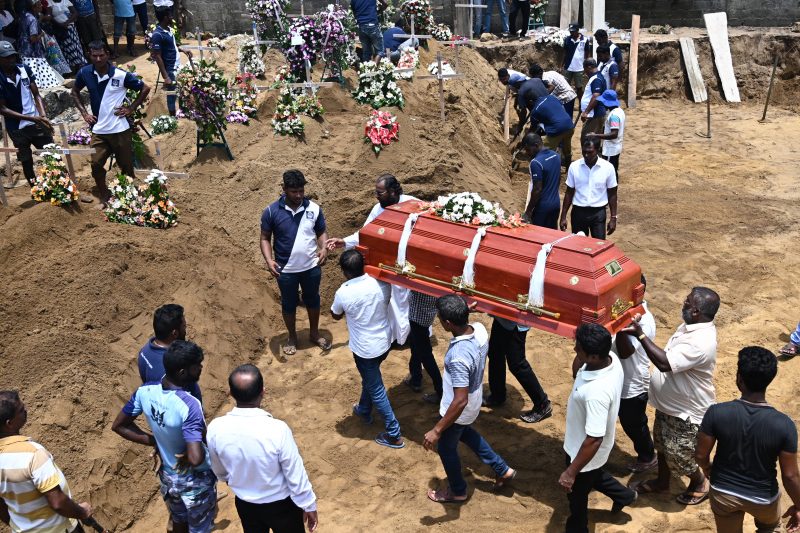Probe shows Sri Lanka attacks ‘retaliation for Christchurch’: government
The first memorial services for the victims were being held as Sri Lanka observed a three minute silence and flags were lowered to half mast (Jewel SAMAD)
Colombo (AFP) – Islamist suicide bombings that killed more than 300 people in Sri Lanka at the weekend were carried out in revenge for last month’s attacks on two mosques in New Zealand, the government said Tuesday, citing an initial police probe.
The revelation came as the death toll in the Easter Sunday bomb attacks on churches and high-end hotels rose to 321, with hundreds more wounded and still in hospital.
“The preliminary investigations have revealed that what happened in Sri Lanka was in retaliation for the attack against Muslims in Christchurch,” state minister of defence Ruwan Wijewardene told parliament.
Fifty people were shot dead on March 15 at two mosques in the New Zealand city by an avowed white nationalist.
Wijewardene said the group behind the Sri Lanka bombings was the little-known National Thowheeth Jama’ath (NTJ), an extremist Islamist group previously blamed for defacing Buddhist statues.
Police have detained at least 40 people as they investigate the worst act of violence in the country since a civil war ended a decade ago.
On Tuesday, grieving Sri Lankans began to bury their dead and the country was observing a day of national mourning.
Three minutes of silence were marked nationwide from 8:30 am (0300 GMT), the time the first suicide bomber struck on Sunday, unleashing carnage at three hotels and three churches packed with Easter worshippers.
Flags were lowered to half mast on government buildings, and liquor shops were ordered closed for the day.
Hours earlier, the government imposed a state of emergency giving police and the military special powers including the ability to arrest suspects without a court order.
– ‘Beyond words’ –
More than a thousand people gathered Tuesday at St Sebastian’s Church in Negombo, north of the capital, which was among those hit in the blasts, to pay tribute to the dead.
An elderly man wept uncontrollably by the coffin bearing the body of his wife, while relatives of other victims stood aghast and silent.
Coffins were carried into the church grounds one-by-one for services, and then to a newly established cemetery on church land.
“It’s beyond words,” said Father Suranga Warnakulasuriya, who had come from another parish to help conduct funerals.
“It’s very hard to bear. For me it is very difficult, so imagine how hard it is for the loved ones.”
The attacks were the worst ever against the country’s small Christian minority, who make up just seven percent of the 21 million population.
Investigators are now hunting for clues on whether NTJ had international support, with government officials saying the attack seemed too well-coordinated for the small group to have carried out alone.
President Maithripala Sirisena’s office said there was intelligence that “international terror groups” were behind the local perpetrators and that he would seek foreign help to investigate.
Officials are investigating why more precautions were not taken after an April 11 warning from Sri Lanka’s police that a “foreign intelligence agency” had reported the NTJ planned suicide attacks on churches.
Government spokesman Rajitha Senaratne said the warning was not passed on to Prime Minister Ranil Wickremesinghe or other top ministers.
– Heavy security –
Tensions remained high and security heavy after a bomb discovered by police on Monday near one of the targeted churches blew up before police could defuse it. Although there was a powerful blast, no injuries were reported.
Police also found 87 bomb detonators at a Colombo bus station.
More details have begun to emerge about some of the foreigners killed in the blasts.
The United States reported at least four Americans killed — including a child — and the Netherlands raised their toll to three.
A Danish billionaire lost three of his children in the attacks, a spokesman for his company said.
The United Nations Children’s Fund (UNICEF) said Tuesday at least 45 children were among those killed.
Eight Britons, ten Indians and nationals from Turkey, Australia, France, Japan and Portugal, were also killed, according to Sri Lankan officials and foreign governments.
The suicide bombers hit three Colombo luxury hotels popular with foreign tourists — the Cinnamon Grand, the Shangri-La and the Kingsbury — and three churches: two in the Colombo region and one in the eastern city of Batticaloa.
Two additional blasts were triggered as security forces carried out raids searching for suspects.
Interpol said it was deploying investigators and specialists to Sri Lanka, and the US State Department warned of possible further attacks in a travel advisory.
Ethnic and religious violence has plagued Sri Lanka for decades, with a 37-year conflict with Tamil rebels followed by an upswing in recent years of clashes between the Buddhist majority and Muslims.
The attacks have sparked local and international outrage, and have been condemned by Sri Lankan Muslim groups, with one urging the “maximum punishment for everyone involved in these dastardly acts”.
Disclaimer: Validity of the above story is for 7 Days from original date of publishing. Source: AFP.


